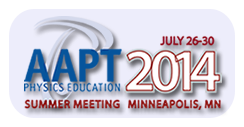Did you know?
In 1919 a Minneapolis factory turned out the nations first armored cars. — www.50states.com
Below is a current list of workshops planned for the 2014 AAPT Summer
Meeting. All workshop will be held on the campus of the University of Minnesota.
Find out more and become a part of SM2014 on: Facebook| Twitter
Some photos courtesy of minneapolis.org
Error in custom script module


